非谓语动词作状语专练30题 练习题 打印版
- 格式:docx
- 大小:15.60 KB
- 文档页数:2
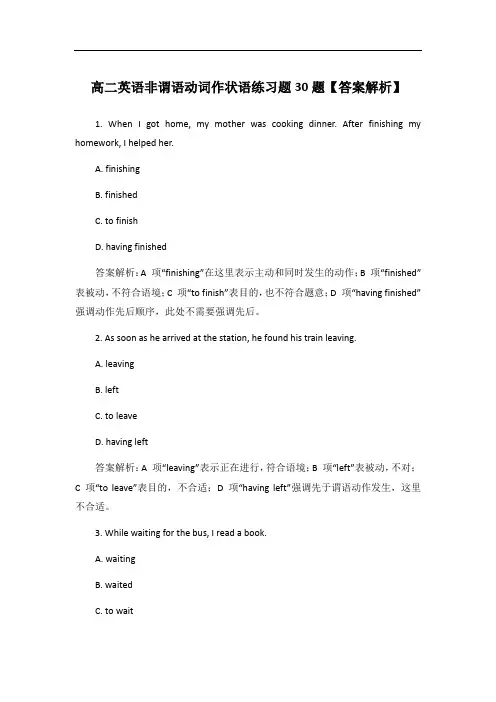
高二英语非谓语动词作状语练习题30题【答案解析】1. When I got home, my mother was cooking dinner. After finishing my homework, I helped her.A. finishingB. finishedC. to finishD. having finished答案解析:A 项“finishing”在这里表示主动和同时发生的动作;B 项“finished”表被动,不符合语境;C 项“to finish”表目的,也不符合题意;D 项“having finished”强调动作先后顺序,此处不需要强调先后。
2. As soon as he arrived at the station, he found his train leaving.A. leavingB. leftC. to leaveD. having left答案解析:A 项“leaving”表示正在进行,符合语境;B 项“left”表被动,不对;C 项“to leave”表目的,不合适;D 项“having left”强调先于谓语动作发生,这里不合适。
3. While waiting for the bus, I read a book.A. waitingB. waitedC. to waitD. having waited答案解析:A 项“waiting”表示主动和同时发生;B 项“waited”形式错误;C 项“to wait”表目的;D 项“having waited”强调先后顺序,此处不需要。
4. Before going to bed, I brushed my teeth.A. goingB. wentC. to goD. having gone答案解析:A 项“going”表示主动和即将发生的动作;B 项“went”形式错误;C 项“to go”表目的;D 项“having gone”强调先后顺序,这里不需要。
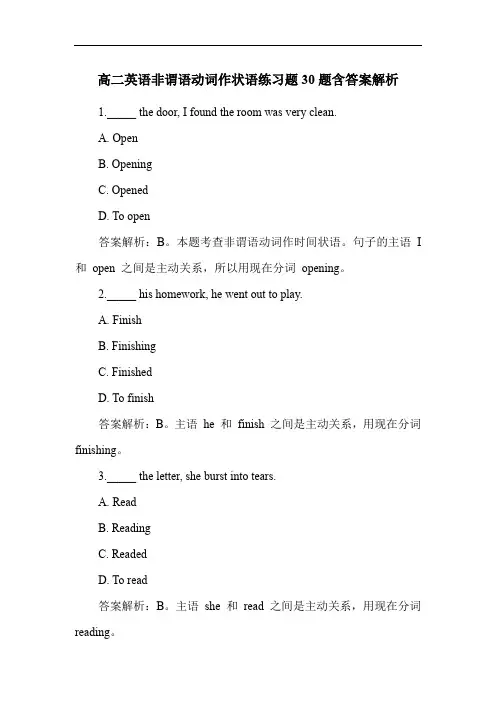
高二英语非谓语动词作状语练习题30题含答案解析1._____ the door, I found the room was very clean.A. OpenB. OpeningC. OpenedD. To open答案解析:B。
本题考查非谓语动词作时间状语。
句子的主语I 和open 之间是主动关系,所以用现在分词opening。
2._____ his homework, he went out to play.A. FinishB. FinishingC. FinishedD. To finish答案解析:B。
主语he 和finish 之间是主动关系,用现在分词finishing。
3._____ the letter, she burst into tears.A. ReadB. ReadingC. ReadedD. To read答案解析:B。
主语she 和read 之间是主动关系,用现在分词reading。
4._____ by the teacher, the students felt very happy.A. PraisedB. PraisingC. PraiseD. To praise答案解析:A。
主语the students 和praise 之间是被动关系,用过去分词praised。
5._____ up early in the morning, he went for a walk.A. GetB. GettingC. GotD. To get答案解析:B。
主语he 和get up 之间是主动关系,用现在分词getting。
6._____ the news, he jumped with joy.A. HearB. HearingC. HeardD. To hear答案解析:B。
主语he 和hear 之间是主动关系,用现在分词hearing。
7._____ the book, I learned a lot.A. ReadB. ReadingC. ReadedD. To read答案解析:B。
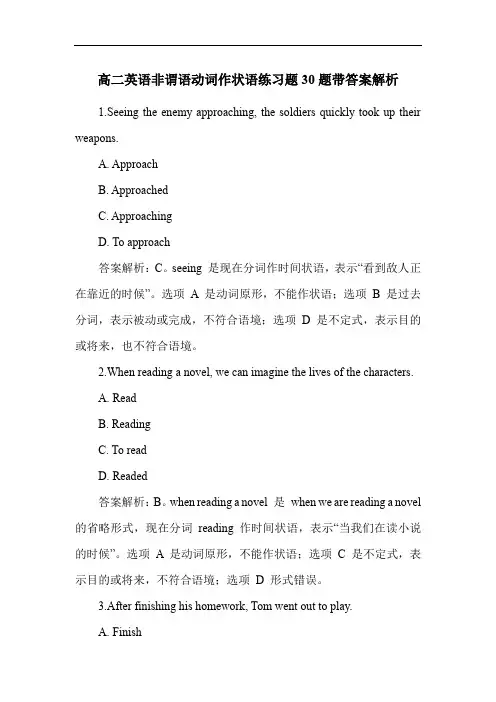
高二英语非谓语动词作状语练习题30题带答案解析1.Seeing the enemy approaching, the soldiers quickly took up their weapons.A. ApproachB. ApproachedC. ApproachingD. To approach答案解析:C。
seeing 是现在分词作时间状语,表示“看到敌人正在靠近的时候”。
选项 A 是动词原形,不能作状语;选项B 是过去分词,表示被动或完成,不符合语境;选项D 是不定式,表示目的或将来,也不符合语境。
2.When reading a novel, we can imagine the lives of the characters.A. ReadB. ReadingC. To readD. Readed答案解析:B。
when reading a novel 是when we are reading a novel 的省略形式,现在分词reading 作时间状语,表示“当我们在读小说的时候”。
选项A 是动词原形,不能作状语;选项C 是不定式,表示目的或将来,不符合语境;选项D 形式错误。
3.After finishing his homework, Tom went out to play.A. FinishB. FinishedC. FinishingD. To finish答案解析:C。
after finishing his homework 是after he finished his homework 的省略形式,现在分词finishing 作时间状语,表示“在完成作业之后”。
选项A 是动词原形,不能作状语;选项B 是过去分词,表示被动或完成,不符合语境;选项D 是不定式,表示目的或将来,不符合语境。
4.Before leaving for school, Mary made sure she had everything she needed.A. LeaveB. LeftC. LeavingD. To leave答案解析:C。
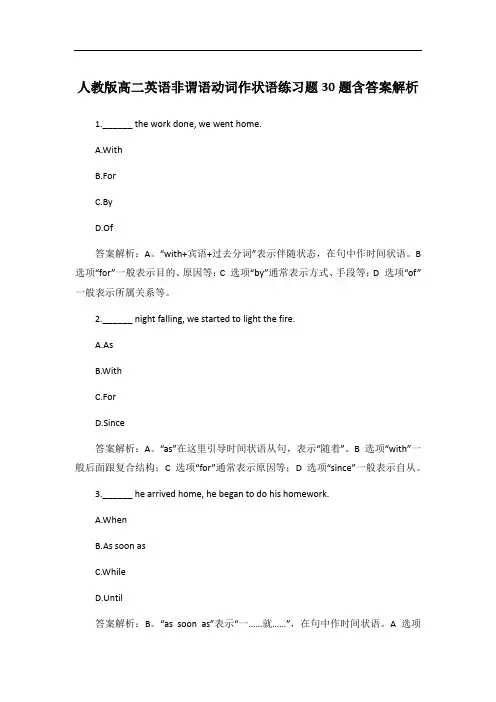
人教版高二英语非谓语动词作状语练习题30题含答案解析1.______ the work done, we went home.A.WithB.ForC.ByD.Of答案解析:A。
“with+宾语+过去分词”表示伴随状态,在句中作时间状语。
B 选项“for”一般表示目的、原因等;C 选项“by”通常表示方式、手段等;D 选项“of”一般表示所属关系等。
2.______ night falling, we started to light the fire.A.AsB.WithC.ForD.Since答案解析:A。
“as”在这里引导时间状语从句,表示“随着”。
B 选项“with”一般后面跟复合结构;C 选项“for”通常表示原因等;D 选项“since”一般表示自从。
3.______ he arrived home, he began to do his homework.A.WhenB.As soon asC.WhileD.Until答案解析:B。
“as soon as”表示“一……就……”,在句中作时间状语。
A 选项“when”表示“当……的时候”,一般强调某个时刻;C 选项“while”强调两个动作同时进行;D 选项“until”表示“直到……才”。
4.______ spring coming on, the trees turn green.A.AsB.WithC.ForD.Since答案解析:A。
“as”引导时间状语从句,表示“随着”。
B 选项“with”一般后面跟复合结构;C 选项“for”一般表示原因等;D 选项“since”一般表示自从。
5.______ he entered the room, he saw his mother.A.As soon asB.WhenC.WhileD.Until答案解析:B。
“when”表示“当……的时候”,在这里强调他进入房间的那个时刻。
A 选项“as soon as”表示“一……就……”;C 选项“while”强调两个动作同时进行;D 选项“until”表示“直到……才”。
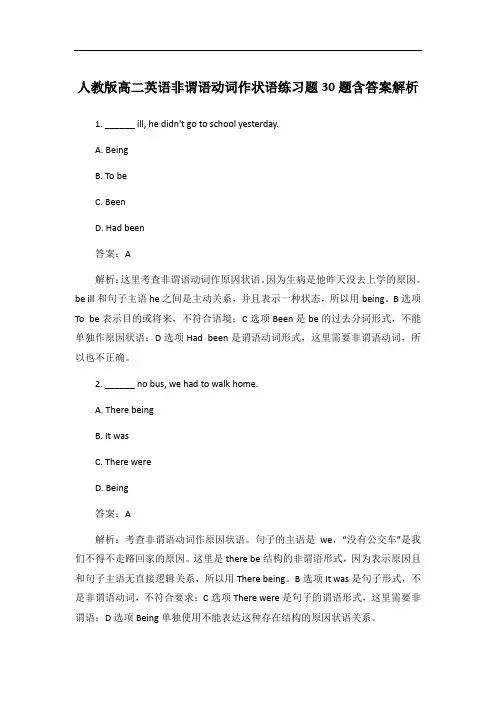
人教版高二英语非谓语动词作状语练习题30题含答案解析1. ______ ill, he didn't go to school yesterday.A. BeingB. To beC. BeenD. Had been答案:A解析:这里考查非谓语动词作原因状语。
因为生病是他昨天没去上学的原因。
be ill和句子主语he之间是主动关系,并且表示一种状态,所以用being。
B选项To be表示目的或将来,不符合语境;C选项Been是be的过去分词形式,不能单独作原因状语;D选项Had been是谓语动词形式,这里需要非谓语动词,所以也不正确。
2. ______ no bus, we had to walk home.A. There beingB. It wasC. There wereD. Being答案:A解析:考查非谓语动词作原因状语。
句子的主语是we,“没有公交车”是我们不得不走路回家的原因。
这里是there be结构的非谓语形式,因为表示原因且和句子主语无直接逻辑关系,所以用There being。
B选项It was是句子形式,不是非谓语动词,不符合要求;C选项There were是句子的谓语形式,这里需要非谓语;D选项Being单独使用不能表达这种存在结构的原因状语关系。
3. ______ not to miss the flight, we arrived at the airport two hours early.A. RemindingB. RemindedC. To remindD. Having reminded答案:B解析:这是考查非谓语动词作原因状语。
句子主语是we,我们被提醒不要错过航班,所以是被动关系。
A选项Reminding是主动形式,不符合;C选项To remind表示目的,不是原因;D选项Having reminded是主动形式的完成式,也不符合。
而B选项Reminded是过去分词形式,表示被动和完成,符合语境。
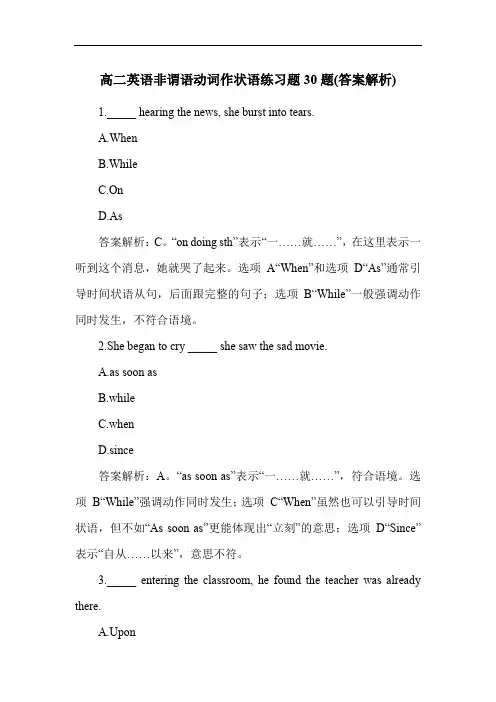
高二英语非谓语动词作状语练习题30题(答案解析)1._____ hearing the news, she burst into tears.A.WhenB.WhileC.OnD.As答案解析:C。
“on doing sth”表示“一……就……”,在这里表示一听到这个消息,她就哭了起来。
选项A“When”和选项D“As”通常引导时间状语从句,后面跟完整的句子;选项B“While”一般强调动作同时发生,不符合语境。
2.She began to cry _____ she saw the sad movie.A.as soon asB.whileC.whenD.since答案解析:A。
“as soon as”表示“一……就……”,符合语境。
选项B“While”强调动作同时发生;选项C“When”虽然也可以引导时间状语,但不如“As soon as”更能体现出“立刻”的意思;选项D“Since”表示“自从……以来”,意思不符。
3._____ entering the classroom, he found the teacher was already there.A.UponB.AsC.WhenD.While答案解析:A。
“upon doing sth”表示“一……就……”。
选项B“As”和选项C“When”后面跟完整句子;选项D“While”强调动作同时发生。
4.He started to run _____ the bell rang.A.as soon asB.whileC.whenD.since答案解析:A。
“as soon as”一……就……,符合语境。
选项B“While”强调同时发生;选项C“When”虽然可以引导时间状语,但不如“As soon as”直接;选项D“Since”表示自从,意思不符。
5._____ he arrived home, he began to do his homework.A.As soon asB.WhileC.WhenD.Since答案解析:A。
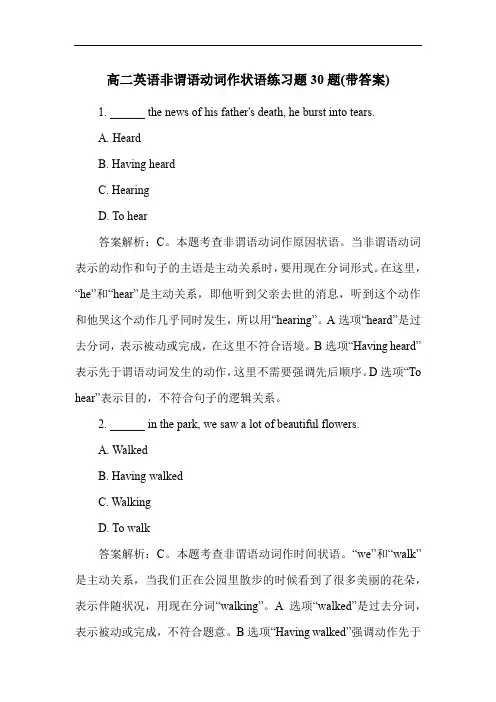
高二英语非谓语动词作状语练习题30题(带答案)1. ______ the news of his father's death, he burst into tears.A. HeardB. Having heardC. HearingD. To hear答案解析:C。
本题考查非谓语动词作原因状语。
当非谓语动词表示的动作和句子的主语是主动关系时,要用现在分词形式。
在这里,“he”和“hear”是主动关系,即他听到父亲去世的消息,听到这个动作和他哭这个动作几乎同时发生,所以用“hearing”。
A选项“heard”是过去分词,表示被动或完成,在这里不符合语境。
B选项“Having heard”表示先于谓语动词发生的动作,这里不需要强调先后顺序。
D选项“To hear”表示目的,不符合句子的逻辑关系。
2. ______ in the park, we saw a lot of beautiful flowers.A. WalkedB. Having walkedC. WalkingD. To walk答案解析:C。
本题考查非谓语动词作时间状语。
“we”和“walk”是主动关系,当我们正在公园里散步的时候看到了很多美丽的花朵,表示伴随状况,用现在分词“walking”。
A选项“walked”是过去分词,表示被动或完成,不符合题意。
B选项“Having walked”强调动作先于谓语动词发生,这里不需要这种先后顺序。
D选项“To walk”表示目的,不符合句子逻辑。
3. ______ for a long time, the boy felt very tired.A. StandingB. Having stoodC. StoodD. To stand答案解析:A。
本题考查非谓语动词作原因状语。
“the boy”和“stand”是主动关系,因为站了很长时间,所以男孩感觉很累,这里表示原因,同时表示动作正在进行,用“Standing”。
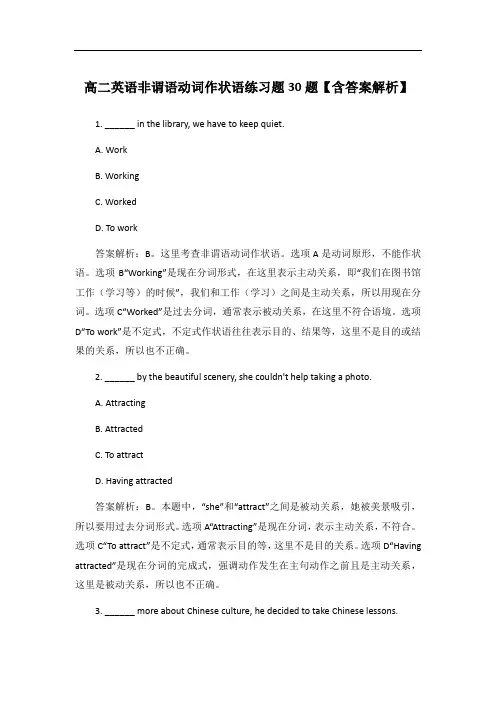
高二英语非谓语动词作状语练习题30题【含答案解析】1. ______ in the library, we have to keep quiet.A. WorkB. WorkingC. WorkedD. To work答案解析:B。
这里考查非谓语动词作状语。
选项A是动词原形,不能作状语。
选项B“Working”是现在分词形式,在这里表示主动关系,即“我们在图书馆工作(学习等)的时候”,我们和工作(学习)之间是主动关系,所以用现在分词。
选项C“Worked”是过去分词,通常表示被动关系,在这里不符合语境。
选项D“To work”是不定式,不定式作状语往往表示目的、结果等,这里不是目的或结果的关系,所以也不正确。
2. ______ by the beautiful scenery, she couldn't help taking a photo.A. AttractingB. AttractedC. To attractD. Having attracted答案解析:B。
本题中,“she”和“attract”之间是被动关系,她被美景吸引,所以要用过去分词形式。
选项A“Attracting”是现在分词,表示主动关系,不符合。
选项C“To attract”是不定式,通常表示目的等,这里不是目的关系。
选项D“Having attracted”是现在分词的完成式,强调动作发生在主句动作之前且是主动关系,这里是被动关系,所以也不正确。
3. ______ more about Chinese culture, he decided to take Chinese lessons.A. LearnB. LearnedC. To learnD. Learning答案解析:C。
这里考查不定式作状语表示目的。
他决定上中文课的目的是更多地了解中国文化。
选项A是动词原形,不能作状语。
选项B“Learned”是过去分词,不符合这里表示目的的语境。
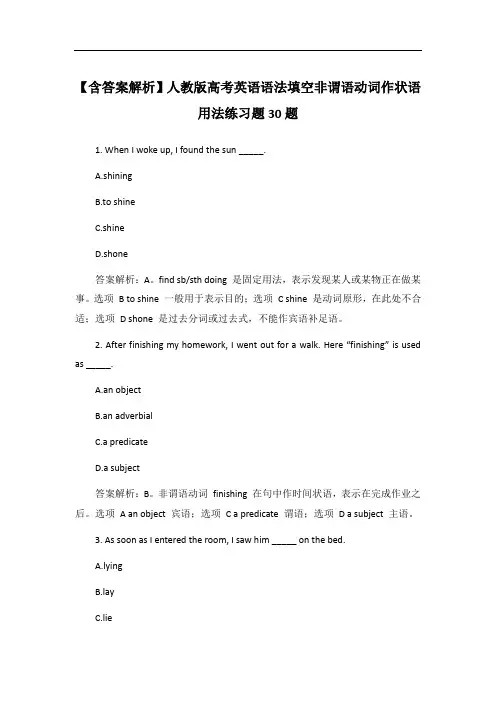
【含答案解析】人教版高考英语语法填空非谓语动词作状语用法练习题30题1. When I woke up, I found the sun _____.A.shiningB.to shineC.shineD.shone答案解析:A。
find sb/sth doing 是固定用法,表示发现某人或某物正在做某事。
选项B to shine 一般用于表示目的;选项 C shine 是动词原形,在此处不合适;选项D shone 是过去分词或过去式,不能作宾语补足语。
2. After finishing my homework, I went out for a walk. Here “finishing” is used as _____.A.an objectB.an adverbialC.a predicateD.a subject答案解析:B。
非谓语动词finishing 在句中作时间状语,表示在完成作业之后。
选项A an object 宾语;选项 C a predicate 谓语;选项 D a subject 主语。
3. As soon as I entered the room, I saw him _____ on the bed.A.lyingyC.lieD.to lie答案解析:A。
see sb doing 表示看到某人正在做某事。
选项 B lay 是动词原形,不能与see 搭配;选项 C lie 的过去式是lay,不是此处的用法;选项 D to lie 表示目的,不符合语境。
4. While waiting for the bus, I read a book. “waiting” is a(n) _____ in this sentence.A.adjectiveB.nounC.verbD.adverbial答案解析:D。
waiting for the bus 在句中作时间状语。
选项 A adjective 形容词;选项B noun 名词;选项 C verb 动词。
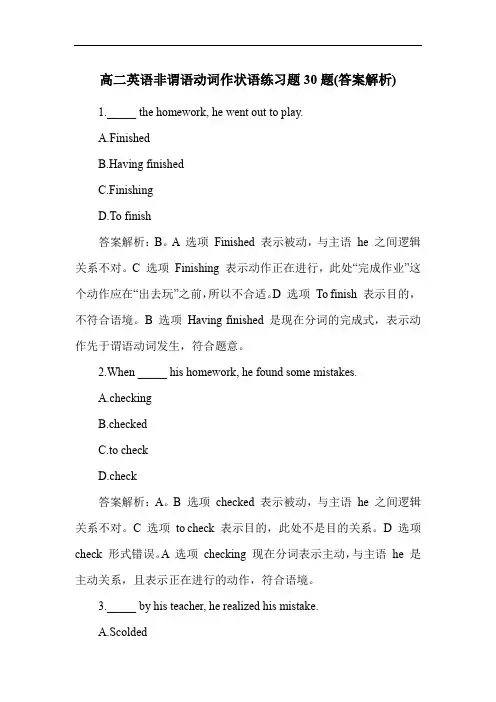
高二英语非谓语动词作状语练习题30题(答案解析)1._____ the homework, he went out to play.A.FinishedB.Having finishedC.FinishingD.To finish答案解析:B。
A 选项Finished 表示被动,与主语he 之间逻辑关系不对。
C 选项Finishing 表示动作正在进行,此处“完成作业”这个动作应在“出去玩”之前,所以不合适。
D 选项To finish 表示目的,不符合语境。
B 选项Having finished 是现在分词的完成式,表示动作先于谓语动词发生,符合题意。
2.When _____ his homework, he found some mistakes.A.checkingB.checkedC.to checkD.check答案解析:A。
B 选项checked 表示被动,与主语he 之间逻辑关系不对。
C 选项to check 表示目的,此处不是目的关系。
D 选项check 形式错误。
A 选项checking 现在分词表示主动,与主语he 是主动关系,且表示正在进行的动作,符合语境。
3._____ by his teacher, he realized his mistake.A.ScoldedB.Having scoldedC.Being scoldedD.Scolding答案解析:C。
A 选项Scolded 表示被动,但不能体现动作正在进行。
B 选项Having scolded 表示主动,与主语逻辑关系错误。
D 选项Scolding 表示主动,与主语逻辑关系错误。
C 选项Being scolded 是现在分词的被动式,表示正在被批评,符合语境。
4.After _____ the book, he understood the story better.A.readingB.readC.to readD.being read答案解析:A。
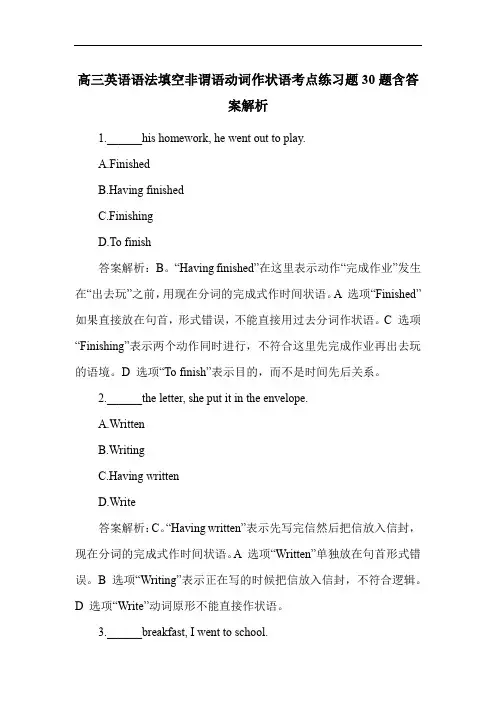
高三英语语法填空非谓语动词作状语考点练习题30题含答案解析1.______his homework, he went out to play.A.FinishedB.Having finishedC.FinishingD.To finish答案解析:B。
“Having finished”在这里表示动作“完成作业”发生在“出去玩”之前,用现在分词的完成式作时间状语。
A 选项“Finished”如果直接放在句首,形式错误,不能直接用过去分词作状语。
C 选项“Finishing”表示两个动作同时进行,不符合这里先完成作业再出去玩的语境。
D 选项“To finish”表示目的,而不是时间先后关系。
2.______the letter, she put it in the envelope.A.WrittenB.WritingC.Having writtenD.Write答案解析:C。
“Having written”表示先写完信然后把信放入信封,现在分词的完成式作时间状语。
A 选项“Written”单独放在句首形式错误。
B 选项“Writing”表示正在写的时候把信放入信封,不符合逻辑。
D 选项“Write”动词原形不能直接作状语。
3.______breakfast, I went to school.A.HadB.Having hadC.HaveD.To have答案解析:B。
“Having had”表示先吃完早饭再去学校,现在分词的完成式作时间状语。
A 选项“Had”不能直接作状语。
C 选项“Have”动词原形不能作状语。
D 选项“To have”表示目的,不是时间先后关系。
4.______the movie, we discussed it for a long time.A.SeenB.SeeingC.Having seenD.See答案解析:C。
“Having seen”表示先看完电影然后讨论,现在分词的完成式作时间状语。
高考英语语法填空非谓语动词作状语用法练习题30题含答案解析1.______by the heavy rain, he was late for school.A.Having been delayedB.DelayedC.Being delayedD.To be delayed答案解析:B。
本题考查非谓语动词作原因状语。
“he”和“delay”之间是被动关系,且“被大雨耽搁”这个动作已经发生,所以用过去分词“Delayed”。
A 选项“Having been delayed”强调动作发生在谓语动词之前,这里没有这种先后顺序的要求;C 选项“Being delayed”表示正在被耽搁,不符合语境;D 选项“To be delayed”表示将来被耽搁,也不符合语境。
2.______his homework, he went out to play.A.Having finishedB.FinishedC.FinishingD.To finish答案解析:A。
本题考查非谓语动词作时间状语。
“he”和“finish”之间是主动关系,且“完成作业”这个动作发生在“出去玩”之前,所以用现在分词的完成式“Having finished”。
B 选项“Finished”表示被动,不符合语境;C 选项“Finishing”只表示主动,没有先后顺序;D 选项“To finish”表示目的,也不符合语境。
3.______for a long time, they were very thirsty.A.Having walkedB.WalkedC.WalkingD.To walk答案解析:A。
本题考查非谓语动词作时间状语。
“they”和“walk”之间是主动关系,且“走了很长时间”这个动作已经发生,所以用现在分词的完成式“Having walked”。
B 选项“Walked”表示被动,不符合语境;C 选项“Walking”只表示主动,没有先后顺序;D 选项“To walk”表示目的,也不符合语境。
人教版高二英语非谓语动词作状语练习题30题含答案解析1. ______ more about Chinese culture, Jack has decided to take Chinese folk music as an elective course.A. LearnB. LearnedC. To learnD. To be learning答案:C解析:本题考查非谓语动词作目的状语。
句意为为了更多地了解中国文化,杰克决定选修中国民间音乐。
这里用不定式To learn表示目的,A选项是动词原形,不能作状语;B选项Learned表示被动或完成,不符合语境;D选项To be learning是不定式的进行式,在此处不需要表示进行的意义,所以C正确。
2. ______ in the poorest area of Glasgow, he had a long, hard road to becoming a football star.A. Being raisedB. RaisingC. RaisedD. To raise答案:C解析:本题考查非谓语动词作原因状语。
句子的主语he和raise (养育)之间是被动关系,即他被养育在格拉斯哥最贫穷的地区,所以要用过去分词Raised。
A选项Being raised虽然也是被动,但强调正在被养育的动作过程,不符合语境;B选项Raising是现在分词,表示主动,不符合逻辑;D选项To raise是不定式,表示目的或将来,与句子逻辑不符。
3. ______ the early flight, we ordered a taxi in advance and got up very early.A. CatchingB. CaughtC. To catchD. Catch答案:C解析:本题考查非谓语动词作目的状语。
为了赶上早班飞机,我们提前订了出租车并且起得很早。
高三英语语法填空非谓语动词作状语考点练习题30题1.The students got up early and went to school, singing happily all the way.( 此处singing 是现在分词作伴随状语,表示与went to school 同时发生的动作)2.When entering the classroom, the students found the teacher already there.entering 是现在分词作时间状语,相当于when they entered)3.Having finished his homework, Tom went out to play.Having finished 是现在分词的完成式作时间状语,表示finish 这个动作发生在went out 之前)4.Arriving at the station, he found the train had left.Arriving 是现在分词作时间状语,相当于when he arrived)5.After doing his homework, he watched TV for a while.doing 是现在分词作时间状语,after 在此处表示时间先后顺序)6.Before going to bed, she read a book.going 是现在分词作时间状语,before 表示在某个动作之前)7.Having been told many times, he still made the same mistake.Having been told 是现在分词的完成被动式作时间状语,表示tell 这个动作发生在made the same mistake 之前且he 是被告诉的)8.As soon as arriving home, he started to cook.arriving 是现在分词作时间状语,as soon as 表示一……就……)9.Once having finished the work, they took a break.having finished 是现在分词的完成式作时间状语,once 表示一旦)10.Upon entering the room, she saw a beautiful painting.entering 是现在分词作时间状语,upon 相当于on,表示一……就……)11.______by the rapid development of technology, many people now rely heavily on smartphones.A.DrivenB.To driveC.DrivingD.Being driven答案:A。
高三英语语法填空非谓语动词作状语考点练习题30题(带答案)1.______ (hear) the news, he jumped with joy.A.HearingB.Have heardC.Having heardD.To hear答案解析:A。
本题考查非谓语动词作时间状语。
hear 和主语he 之间是主动关系,且“听到消息”和“高兴地跳起来”几乎同时发生,所以用现在分词Hearing。
B 选项Have heard 是谓语动词形式,不符合要求;C 选项Having heard 表示动作先于谓语动词发生,这里不合适;D 选项To hear 表目的,不符合语境。
2.______ (see) the teacher coming, the students stopped talking.A.SeeingB.SeenC.Having seenD.To see答案解析:A。
see 和主语the students 之间是主动关系,“看到老师来”和“停止说话”几乎同时发生,用现在分词Seeing。
B 选项Seen 是过去分词表被动,不符合;C 选项Having seen 动作先于谓语动词发生,这里不合适;D 选项To see 表目的,不符。
3.______ (arrive) at the station, he found the train had left.A.ArrivingB.ArrivedC.Having arrivedD.To arrive答案解析:C。
arrive 和主语he 之间是主动关系,且“到达车站”发生在“发现火车离开”之前,所以用现在分词的完成式Having arrived。
A 选项Arriving 表示同时发生,不合适;B 选项Arrived 是过去分词表被动,不符;D 选项To arrive 表目的,不对。
4.______ (finish) his homework, he went out to play.A.FinishingB.FinishedC.Having finishedD.To finish答案解析:C。
高考英语语法填空非谓语动词作状语用法练习题30题(带答案)1. ______ (save) time, he took a taxi to the airport.答案:To save。
解析:这里是不定式作目的状语,表示他坐出租车去机场的目的是节省时间。
2. ______ (wait) for the bus, he read a book.答案:Waiting。
解析:这里是现在分词作时间状语,表示在等公交车的时候他读书,分词动作和主句动作同时发生。
3. ______ (finish) his homework, he went out to play.答案:Having finished。
解析:这里是现在分词的完成式作时间状语,表示先完成作业这个动作,之后才出去玩。
4. ______ (not know) how to get there, he asked a policeman.答案:Not knowing。
解析:这里是现在分词的否定形式作原因状语,表示因为不知道怎么去那里所以问警察。
5. ______ (look) out of the window, she saw a beautiful garden.答案:Looking。
解析:这里是现在分词作时间状语,表示看窗外这个动作和看到美丽花园这个动作同时发生。
6. He turned off the light, ______ (not want) to waste electricity.答案:not wanting。
解析:这里是现在分词的否定形式作伴随状语,表示他关灯的同时不想浪费电。
7. ______ (be) ill, he didn't go to school.答案:Being。
解析:这里是现在分词作原因状语,表示因为生病所以没去上学。
8. ______ (see) from the top of the hill, the town looks very beautiful.答案:Seen。
高考英语语法填空非谓语动词作状语用法练习题30题1<背景文章>Non-Finite Verbs as Adverbials in Literary WorksIn literature, non-finite verbs are often used as adverbials to add vividness and expressiveness to the descriptions. For example, in the famous novel "Pride and Prejudice", the author Jane Austen uses non-finite verbs as adverbials to describe the characters' emotions and actions. "Walking in the garden, Elizabeth felt a sense of peace and tranquility." Here, "walking in the garden" is a present participle phrase used as an adverbial, modifying the verb "felt". It gives us more details about when and how Elizabeth felt peaceful.Another example can be found in Shakespeare's plays. In "Hamlet", "Thinking deeply about his father's death, Hamlet became more and more melancholy." The non-finite verb phrase "thinking deeply about his father's death" functions as an adverbial, showing the state of Hamlet's mind while he was pondering over the tragic event.The use of non-finite verbs as adverbials not only enriches the language but also helps readers better understand the characters and the story. It can create a more immersive reading experience by providing additional context and atmosphere.1. In the sentence "___ in the park, Tom saw a beautiful flower.", what is the correct non-finite verb phrase?A. WalkedB. WalkingC. To walkD. Walks答案:B。
非谓语动词专练30题练习题1.Mr. Brown came in two students.A. followB. followedC. followed byD. to follow2.Badly , the soldier continued to fire back at the enemy.A. woundB. woundedC. woundingD. wounds3.from heart trouble for years, Professor White has to take some medicine wherever he goes.A. SufferedB. SufferingC. Having sufferedD. Being suffered 4.__ __, I’ll pay a visit to Mr. Liang in Wuhan.A. Time permitsB. Time permittingC. With time permittedD. When time permitting 5.__ __, he is to blame.A. Having not passed the testB. Not passed the testC. His pupil not having passed the testD. Not his pupil passing test6.With a high way __ __ here, the government has to solve a lot of problems at once.A. builtB. buildingC. to buildD. to be built7. The population of Korea is now very small, only one tenth of the people living inAustralia.A. made upB. to make upC. making upD. makes up8. ──Why did he make marks on some trees?── his way back easily.A. FindB. To findC. FindingD. In order to finding9. such difficult work before, he felt it was terribly hard for him.A. Not having doneB. Not have doneC. Having not doneD. Not having been done10. Once lost, _______ _______.A. it is hard to get such a chance again.B. to get such a chance will be difficultC. one can never get such a chance againD. such a chance might never come again11. ,tears came into his eyes.A. Moved by her wordsB. Moving by her wordsC. He was moved by her wordsD. Because he was moved by her words12. Yesterday, I called you, you some information on computer.A. askedB. askingC. and askD. to ask13. __ __his father, Wang Lin entered the room, __ __ by his two brothers.A. Follow, followB. Following; followC. Followed; followingD. Following; followed14. ____ _ in her best suit, the girl tried to make herself _____ at the party.A. Dressed; noticedB. Dressing; noticingC. Dressed; noticingD. Dressing; noticed15. Hearing the news, he rushed out, ___ ____the book ____ __ on the table and disappeared into the distance.A. left; lain openB. leaving; lying openC. leaving; lie openD. left, lay open16. The young man rushed out of the room, __ ___ into his car and started it hurriedly, ___ to get home as soon as possible.A. got; hopedB. getting; and hopedC. got; hopingD. getting; hoped17. , all the students shouted and jumped with joy.A. To be excitedB. Having been excitedC. ExcitingD. Being excited18. from the moon, the earth looks like a water-covered globe.A. WatchingB. LookedC. SeenD. Seeing19. the place on the map, they discussed which way they should take.A. Having locatedB. LocatingC. LocatedD. To locate20. the seriousness of pollution, all countries in the world have made an agreement that they will fight against it together.A. RealizedB. Having realizedC. To realizeD. Realizing21. , they walked slowly across the street.A. Guiding the blindB. The boy guiding the blind old manC. Guided the blind old manD. The boy guided the blind old man22. Jenny went to the reading room, the door .A. finding…lockedB. found…lockedC. to find…being lockedD. and found…locking23. her accent, she must be from Northeast China.A. Judge byB. Judged byC. Judged fromD. Judging from24. by the story in the movie, we could not help tears.A. Deeply moved…shedB. Moved deeply…shedC. Deeply moved…sheddingD. Moved deeply…shedding25. __ ___ his age, the little boy read quite well.A. ConsideringB. ConsideredC. ConsiderD. Having considered26. — What would I need, besides a sewing-machine, a dress?—You’d have to have some material and a pair of scissors(剪刀)。
A. makeB. madeC. makingD. to make27. He tried many times to sneak across the border to a neighboring country, every time.A. having been caughtB. unfortunately caughtC. always being caughtD. only to be caught28. We are sure that everything will go well as .A. to be plannedB. plannedC. being planedD. having been planned29. to someone, a British person often shakes hands with the stranger.A. IntroducingB. To introduceC. To be introducedD. On being introduced30. time and labour, cartoonists generally draw the hands of their characters with only three fingers and a thumb.A. To saveB. SavedC. SavingD. Having saved。